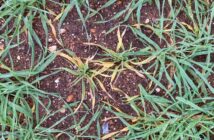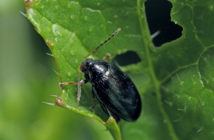Spring cereal crops face a serious challenge from broad-leaved weeds, warns Dow AgroSciences, as recent weather has hardened emerged weeds and encouraged late flushes – ready to threaten yields and profits.
This adds to the headache for those growing increased areas of spring cereals. Narrow spray windows are hampering necessary crop protection opportunities.
Herbicide expert Stuart Jackson, from Dow AgroSciences, says: “Residuals applied to relatively dry soils have not been helped by continued dry weather in April. As a result a large number of broad-leaved weed species are likely to have come through.
“Thanks to cold nights, warm days and relatively dry soils since drilling, broad-leaved weeds that germinated early are becoming harder to control. And recent rain will encourage flushes of late-germinating weeds which will also require attention.
“Not only do broad-leaved weeds pose a threat to yield, some species such as cleavers can hamper harvest. So it’s important that growers complete spray programmes and pay close attention to ensure dose rates are matched to crop and weed growth stages, for the best possible control.”
Dow’s Dakota®, Galaxy® and Spitfire® products all contain a mixture of active ingredients that provide robust control of a wide range of competitive broad-leaved weeds such as cleavers, poppy, mayweed, groundsel, charlock, even when temperatures are highly variable and the weeds tough.
These products also have a wide range of fully supported tank mixes including fungicides, PGRs and trace elements, giving growers the opportunity to apply tank mixes with confidence.
Limiting the risk of resistance to sulphonyl urea (SU) herbicides also needs consideration. Although resistance has been confirmed in relatively disparate locations, many growers and agronomists report difficulty in controlling poppy, mayweed and chickweed with SU chemistry, in these situations ring the changes by choosing spring herbicides actives with different modes of action, to minimise resistance evolving,” suggests Mr Jackson.



